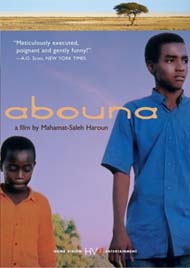| Release List | Reviews | Price Search | Shop | Newsletter | Forum | DVD Giveaways | Blu-Ray/ HD DVD | Advertise |
| Reviews & Columns |
|
Reviews DVD TV on DVD Blu-ray International DVDs Theatrical Reviews by Studio Video Games Features Collector Series DVDs Easter Egg Database Interviews DVD Talk TV DVD Talk Radio Feature Articles Columns Anime Talk DVD Savant HD Talk Horror DVDs Silent DVD
|
DVD Talk Forum |
|
|
| Resources |
|
DVD Price Search Customer Service #'s RCE Info Links |
|
Columns
|
 |
Abouna
|
||||
One expects ethnological insights in regional films from Third-World directors, but in the remarkable feature Abouna we're treated to the work of a director with an excellent eye for behavior, personal relationships and visual beauty. In a dry region of Africa, two boys from a broken family try to make sense of their frustrating environment. Without a single word of exposition, we're invited to share the personal lives of these civilized little men as they bravely face their problems and make the best of things.
In a nicely shot interview extra, director Mahamat-Saleh Haroun explains that Abouna is his second feature (the first was Bye Bye Africa) but the first shot on film. The director's deceptively simple approach presents the world as experienced by these two boys, who act so naturally we seem to be watching transparent behaviors instead of directed performances. Tahir is several years older and although the two scrap like puppies, their devotion is complete. When we first meet them an apparently harmonious family situation has disintegrated; father won't be there to referee their soccer matches any more. Mother sews in silence and disappears on her scooter to work, and the unsupervised boys think that father will turn up if they just look for him. Mother tends to the sickly Amine and intercedes when they have trouble with the police, but it's not long before the boys are relocated in a strange town under the watchful eye of a religious teacher. Both are beaten for perceived insolence and an escape attempt that ends because Anime gets a thorn in his foot. Tahir meets a girl who takes a fancy to him (Mounira Kahlil); that and a solemn vow given over the Koran helps him decide not to run off after all. But when the other boys steal Amine's asthma medicine, the honey remedy given by the teacher's gentle wife doesn't help him to breathe ... Mahamat-Saleh Haroun demonstrates a sure hand with his nonprofessional actors and explains that before filming he had them live together for two weeks to develop a credible rapport. They aren't poor boys - their clothing is simple but dignified - and they seem to have a natural relationship with the landscape. We grow to like them without noticing any emotional strings being tugged. The only aspect that seems imposed from without is the director's interest in film, as the little theater in the boy's town is showing Stranger than Paradise and Chaplin's The Kid, as if Chad had its own mini-version of the Cinematheque Francais. At one point Amine tries to steal a film still, as in Truffaut's Day for Night. Director Haroun is based in Paris but his film crew appears to be genuinely African. Although the pace is deliberate our attention is held by creative camerawork that need make no apologies. The colors of the earthen buildings are warm and inviting and sophisticated camera technique composes in depth and balances the light through windows and archways - there are never any burned-out areas of the frame. Haroun's images have a refreshing visual clarity that sidesteps merely pretty, travelogue effects. Chad looks crisp, dry and clean. Home Vision Entertainment's DVD of Abouna is beautifully transferred from perfect prime elements. The enhanced image is rich and colorful; cameraman Abraham Haile Biru must be a student of Winton Hoch in his use of wide exteriors and dark interiors cut by pools of light. The modern African rhythm score is tastefully used. The language on the soundtrack is Chad Arabic mixed with French. Other extras besides Haroun's impressive interview are a trailer and two of his earlier short films, Goï Goï and B 400. Phil Hall of Wired Magazine contributes thoughtful and expressive liner notes.
On a scale of Excellent, Good, Fair, and Poor,
Abouna rates:
Review Staff | About DVD Talk | Newsletter Subscribe | Join DVD Talk Forum |
|
| Release List | Reviews | Price Search | Shop | SUBSCRIBE | Forum | DVD Giveaways | Blu-Ray/ HD DVD | Advertise |






